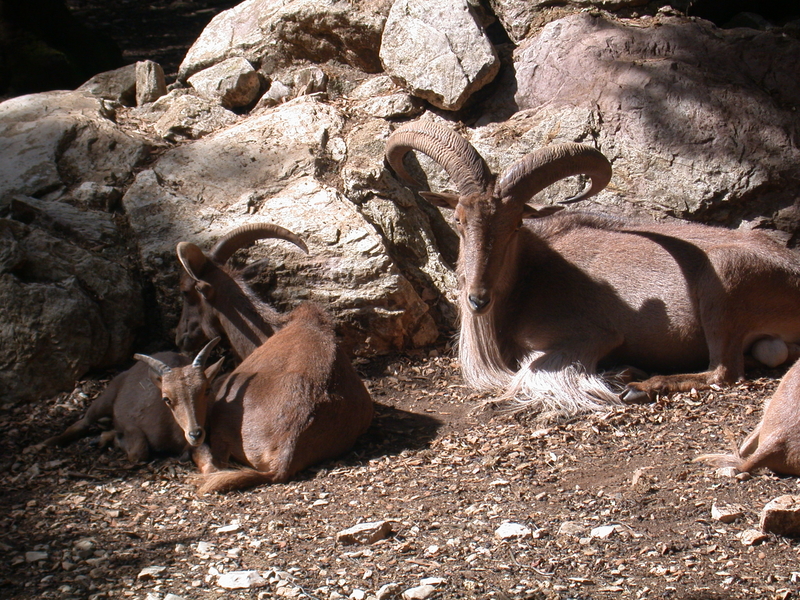|
| Query: caucasian chamois | Result: 2nd of 2 | |
Goat Antelope (Family: Bovidae, Subfamily: Caprinae) - Wiki
| Subject: | Goat Antelope (Family: Bovidae, Subfamily: Caprinae) - Wiki
| |

| Resolution: 2048x1536
File Size: 1119912 Bytes
Date: 2005:08:06 16:14:08
Camera: E995 (NIKON)
F number: f/1.0
Exposure: 10/1611 sec
Focal Length: 310/10
Upload Date: 2007:10:19 02:01:39
|
Goat antelope
From Wikipedia, the free encyclopedia
[Photo] Barbary Sheep, Ammotragus lervia. Immagine di Ammotragus Lervia dalla Citt?? della Domenica - Perugia. Date: 6 August 2005. Photographer: Massimo Finizio (http://commons.wikimedia.org/wiki/User:Finizio)
A goat antelope is any of the species of mostly medium-sized bovids that make up the subfamily Caprinae or the single species in subfamily Pantholopinae. The domestic sheep and domestic goat are both part of the goat antelope group, and the group itself is part of the family Bovidae, which in other branches contains the antelopes and domestic cattle.
The goat antelope or caprid group is known from as early as the Miocene, but did not reach its greatest diversity until the recent ice ages, when many of its members became specialised for marginal, often extreme, environments: mountains, deserts, and the sub-Arctic region. In consequence, although most goat antelopes are gregarious and have a fairly stocky build, they diverge in many other ways. The Musk Ox, Ovibos moschatus, became adapted to the extreme cold of the tundra; the Rocky Mountain Goat, Oreamnos americanus, of North America specialised in very rugged terrain; the Urial, Ovis orientalis, occupied a largely infertile area from Kashmir to Iran, including much desert country. The European Mouflon, Ovis musimon, is thought to be the ancestor of the modern Domestic Sheep, Ovis aries.
Many of the ice age species are now extinct, probably largely because of human interaction. Of the survivors:
- five are classified as endangered,
- eight as vulnerable,
- seven as of concern and needing conservation measures but at lower risk, and
- seven species are secure.
Members of the group vary considerably in size, from just over a metre for a full-grown Gray Goral, Nemorhaedus goral, to almost 2.5 metres for a Musk Ox, and from under 30 kg to more than 350 kg. Musk Oxen in captivity have reached over 650 kg.
In lifestyle, the caprids fall into two broad classes, resource defenders which are territorial and defend a small, food-rich area against other members of the same species, and grazers, which gather together into herds and roam freely over a larger, usually relatively infertile area.
The resource defenders are the more primitive group: they tend to be smaller in size, dark in colour, males and females fairly alike, have long, tasselated ears, a long mane, and dagger-shaped horns. The grazers evolved more recently. They tend to be larger, highly social, and rather than mark territory with scent glands, they have highly evolved dominance behaviours. There is no sharp dividing line between the groups, just a continuum between the serows at one end of the spectrum and sheep, true goats, and Musk Oxen at the other.
The ancestors of the modern sheep and goats (both rather vague and ill-defined terms) are thought to have moved into mountainous regions: sheep becoming specialised occupants of the foothills and nearby plains, and relying on flight and clumping for defence against predators; goats adapting to very steep terrain where predators are at a disadvantage.
Classification
FAMILY BOVIDAE
Subfamily Bovinae: cattle and spiral-horned antelopes; 24 species in nine genera
Subfamily Cephalophinae: duikers; 19 species in two genera
Subfamily Hippotraginae: grazing antelopes; 23 species in 11 genera
Subfamily Antilopinae: gazelles, dwarf antelopes and the Saiga; 38 species in 14 genera
Subfamily Caprinae
Genus Ammotragus
Barbary Sheep, Ammotragus lervia
Genus Budorcas
Takin, Budorcas taxicolor
Genus Capra
Wild Goat, Capra aegagrus
Domestic goat, Capra aegagrus hircus
West Caucasian Tur, Capra caucasia
East Caucasian Tur, Capra cylindricornis
Markhor, Capra falconeri
Alpine Ibex, Capra ibex
Nubian Ibex, Capra nubiana
Spanish Ibex, Capra pyrenaica
Siberian Ibex, Capra sibirica
Walia Ibex, Capra walie
Genus Hemitragus
Nilgiri Tahr, Hemitragus hylocrius
Arabian Tahr, Hemitragus jayakari
Himalayan Tahr, Hemitragus jemlahicus
Genus Nemorhaedus
Red Goral, Nemorhaedus baileyi
Chinese Goral, Nemorhaedus caudatus
Japanese Serow, Nemorhaedus crispus
Gray Goral, Nemorhaedus goral
Mainland Serow, Nemorhaedus sumatraensis
Taiwan Serow, Nemorhaedus swinhoei
Genus Oreamnos
Rocky Mountain Goat, Oreamnos americanus
Genus Ovibos
Musk Ox, Ovibos moschatus
Genus Ovis
Argali, Ovis ammon
Domestic Sheep, Ovis aries
American Bighorn Sheep, Ovis canadensis
Dall or Thinhorn Sheep, Ovis dalli
European Mouflon, Ovis musimon
Snow Sheep, Ovis nivicola
Urial, Ovis orientalis
Genus Pseudois
Bharal (Himalayan blue sheep), Pseudois nayaur
Dwarf Blue Sheep, Pseudois schaeferi
Genus Rupicapra
Pyrenean Chamois, Rupicapra pyrenaica
Chamois, Rupicapra rupicapra
Subfamily Pantholopinae
Genus Pantholops
Chiru (Tibetan antelope), Pantholops hodgsoni
http://en.wikipedia.org/wiki/Goat_antelope
| The text in this page is based on the copyrighted Wikipedia article shown in above URL. It is used under the GNU Free Documentation License. You may redistribute it, verbatim or modified, providing that you comply with the terms of the GFDL. |
|
Comments |
|---|
| | Guest |
|
Scientific Name: Ammotragus lervia (Pallas, 1777)
Common Names:
English – Aoudad, Uaddan, Barbary Sheep
French – Mouflon À Manchettes |
| | Guest |
|
Scientific Name: Ammotragus lervia (Pallas, 1777)
Common Names: Aoudad, Uaddan, Barbary Sheep; [French] Mouflon À Manchettes
Synonyms: Antilope lervia, Capra lervia |
^o^
Animal Pictures Archive for smart phones
^o^
|
|
|

